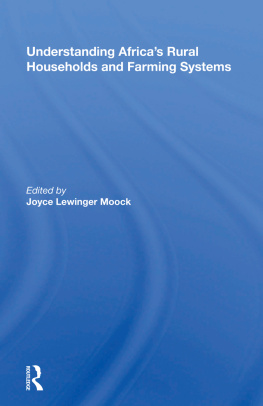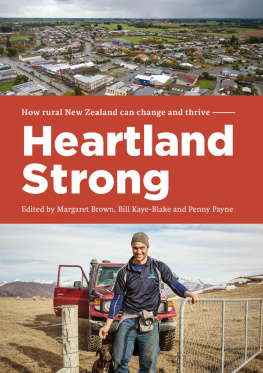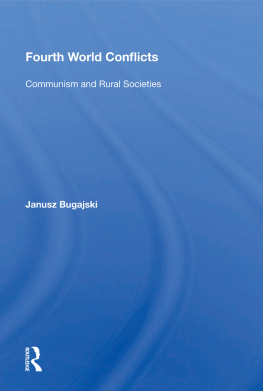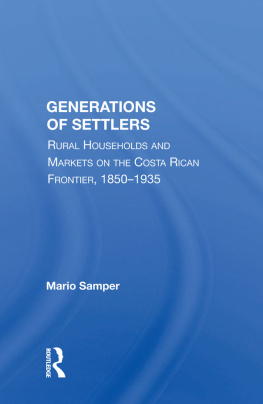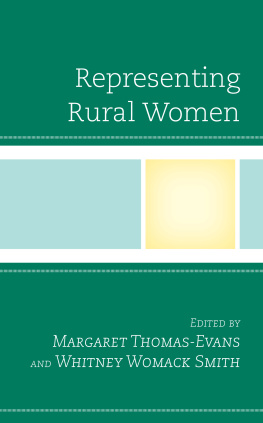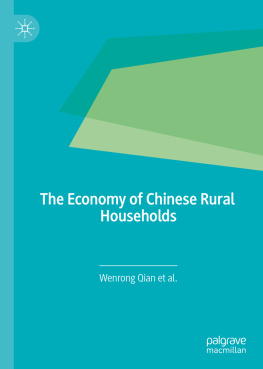Rural Households in Emerging Societies
The constantly altering circumstances of rural life in sub-Saharan Africa have brought with them both successes and failures. The essays in this volume examine the various pressures and inducements to changing resource-use patterns faced by rural households, and explore the two-way causal relationship between technology and technological change on the one hand and other key elements of rural change - demographic, environmental, economic, social, and political - on the other. Contemporary approaches to the introduction of technical innovations are examined, and new approaches are proposed. Through case studies of particular communities, the wide-ranging impacts of past experiences are assessed, and the causes and consequences of indigenous initiatives are explored.
Margaret Haswell is an Independent Consultant in Rural Development.
Diana Hunt is Lecturer in Economics at the School of African and Asian Studies, Sussex University.
First published 1991 by Berg Publishers
Published 2020 by Routledge
2 Park Square, Milton Park, Abingdon, Oxon OX14 4RN
605 Third Avenue, New York, NY 10017
Routledge is an imprint of the Taylor & Francis Group, an informa business
Margaret Haswell and Diana Hunt, 1991
All rights reserved. No part of this book may be reprinted or reproduced or utilised in any form or by any electronic, mechanical, or other means, now known or hereafter invented, including photocopying and recording, or in any information storage or retrieval system, without permission in writing from the publishers.
Notice:
Product or corporate names may be trademarks or registered trademarks, and are used only for identification and explanation without intent to infringe.
British Library Cataloguing in Publication Data
Rural households in emerging societies: technology and
change in sub-Saharan Africa.
1. Africa south of the Sahara. Rural communities. Social conditions
I. Title II. Haswell, Margaret III. Hunt, Diana
307.720967
Library of Congress Cataloging-in-Publication Data
Rural households in emerging societies: technology and change in
sub-Saharan Africa / edited by Margaret Haswell & Diana Hunt.
p. cm.
Includes index.
1. Rural development-Africa, Sub-Saharan 2. Rural development-Africa,
Sub-Saharan-Case studies. 3. Family farms-Africa, Sub-Saharan.
4. Family farms-Africa, Sub-Saharan-Case studies.
I. Haswell, Margaret Rosary. II. Hunt, Diana, 1942-
HN780.Z9C6722 1991
90-26657
307.1 4120967-dc20
CIP
ISBN 13: 978-0-8549-6730-8 (hbk)
Contents
Paul Richards
Robert Chambers and Camilla Toulmin
Diana Hunt
Paul Starkey
Jan Douwe van der Ploeg
Camilla Toulmin
Margaret Haswell
Josephine Wanja Harmsworth
Angela Cheater
Domien Bruinsma and Robert Nout
Guide
Domien Bruinsma trained as a food technologist at the Agricultural University of Wageningen, The Netherlands. He spent six-years in Mozambique as a governmental technology consultant. Presently, he is attached to the section Food and Nutrition of the International Agricultural Centre, Wageningen, where he is in charge of advisory tasks and the planning and design of a postgraduate course on food quality assurance.
Robert Chambers went on from his original work in public administration to include other aspects of rural development including national policy, settlement schemes, rural refugees in Africa and agrarian change in South Asia. His interests include seasonality, rapid rural appraisal, canal-irrigation management, agricultural research, social and agro-foresty, the role of NGOs in relief and rural development, and professionalism and the nature of rural poverty. He is a fellow of The Institute of Development Studies at the University of Sussex.
Angela Cheater is professor of sociology at the University of Zimbabwe. She has researched extensively in Zimbabwe among black freehold farmers, as well as among fishermen and industrial workers. She has also researched in China on comparative studies.
Josephine Wanja Harmsworth trained as an anthropologist and went to live in Uganda in 1960. She has had a varied work experience, chiefly as a socio-economist, and is now an independent consultant.
Margaret Haswell is an independent consultant specialising in village survey techniques, social infrastructure, monitoring and evaluation of operational problems. A former Oxford University lecturer in agricultural economics and former Fellow of St Hughs College, she has worked in East and West Africa, South and Southeast Asia, the Caribbean and the South Pacific, while continuing to research on agrarian change in a middle river area of The Gambia.
Diana Hunt is an economist based at the School of African and Asian Studies, University of Sussex. She has long-standing research and consultancy experience in the fields of agricultural and rural development in Africa. She has conducted lengthy periods of field research in Uganda (on the organisation and impact of small farm credit programmes) and in Kenya (on the impact of government development policy on rural households of varying socioeconomic status in semi-arid areas).
Robert Nout trained as a food scientist at the Agricultural University of Wageningen. He spent twelve years in Mali, Nigeria and Kenya, involved in university manpower training of food technologists. Presently, he is a senior lecturer in Food Microbiology at the Agricultural University of Wageningen.
Paul Richards is reader in Anthropology at University College, London. He is currently working on social aspects of rain-forest conservation in Sierra Leone, and has recently completed a comparative study of the impact of rice research in South Asia and West Africa with Michael Lipton and Adam Pain.
Paul Starkey is an independent consultant, specialising in animal traction. He has been a Technical Co-operation Officer in Sierra Leone, where he initiated a national animal traction programme. He is currently Technical Adviser of the West Africa Animal Traction Network, and an Honorary Reseach Fellow at the Centre for Agricultural Strategy in the University of Reading.
Camilla Toulmin is currently Director of the Drylands Programme at the International Institute for Environment and Development, London. The main concerns of this programme are research, networking and support to non-governmental organisations in Africa through information and training activities. An economist by training, she carried out her thesis field work in Mali.
Jan Douwe van der Ploeg trained as an agronomist, and worked for fifteen years in Latin America and Africa, including Guinea Bissau. He then took a PhD in Social Sciences and now teaches at Wageningen University, The Netherlands, while continuing to research on agrarian change in southern Europe, Latin America and Africa.
All the papers presented in this book, with one exception, that by Paul Richards, were first discussed at a workshop held at the School of African and Asian Studies, University of Sussex, in September 1989. Underlying the broad title of the workshop was the thesis that there is a two-way relationship between technology and technological change on the one hand, and other elements of rural change - demographic, economic, social, cultural and political - on the other. The focus throughout our discussions was upon



